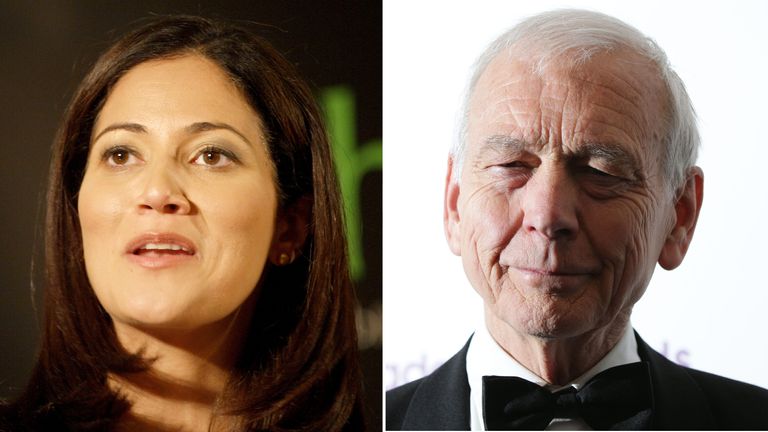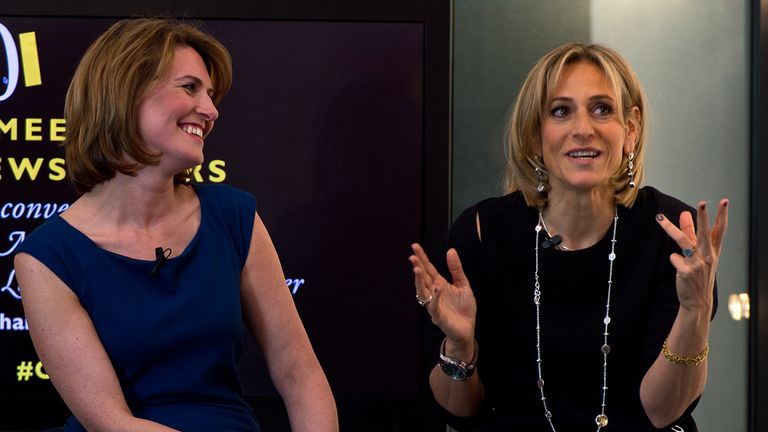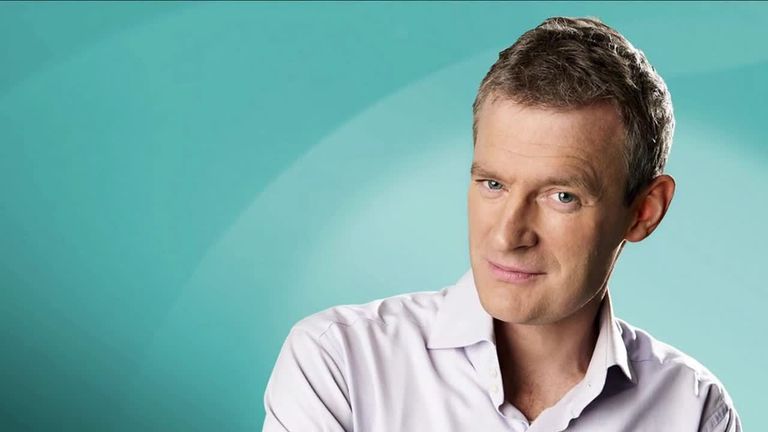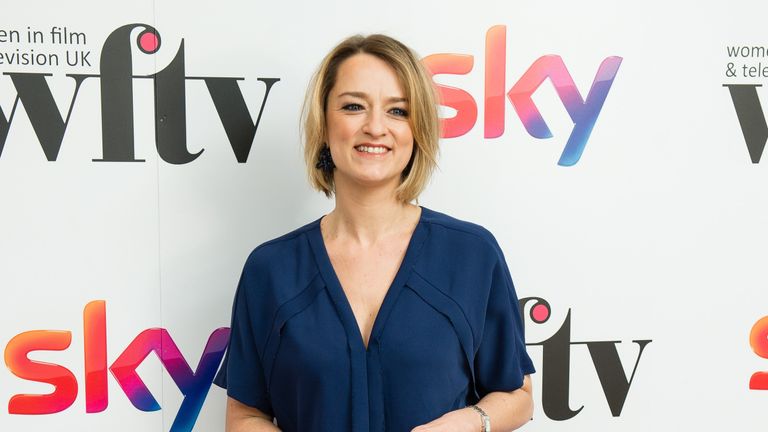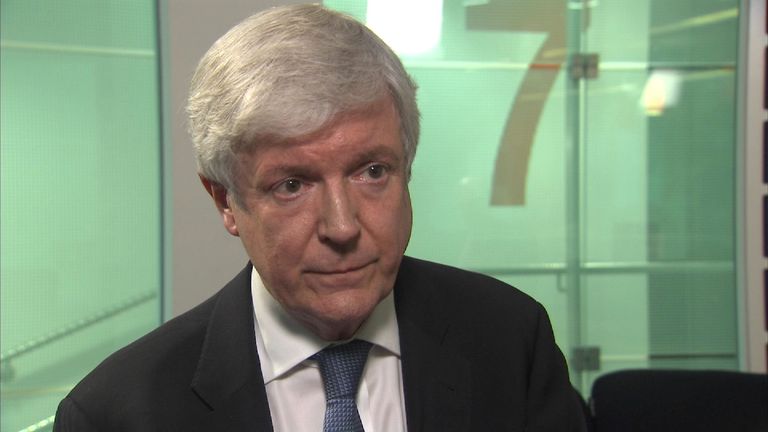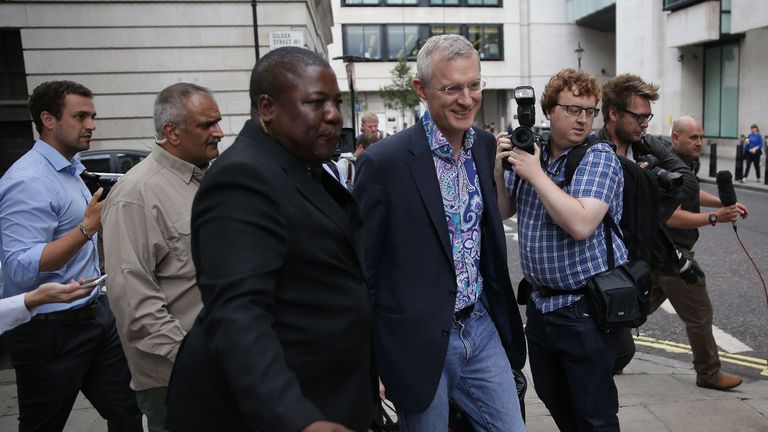The BBC gender pay gap is bad - but its class gap is worse
In all the sound and fury about BBC pay, the fact that many of its stars are from privileged backgrounds has been overlooked.
Sunday 23 July 2017 06:40, UK
To educate, to inform and entertain is the BBC's motto.
Well, after this week we're certainly better educated and informed about the salaries of its top on-screen personalities.
Less entertaining, however, were some of the inequalities the list revealed: of the 96 names on the list of the BBC's mega earners, just under a third were women. Moreover the highest-paid woman was paid considerably less than the top male earners.
Many absolute stars, like Emily Maitlis and Sarah Montague, failed to make the cut for doing much the same job as their male counterparts. Cue righteous and rightful anger from all sides, even from publications not exactly known as scions of feminism.
:: Full list of BBC stars earning more than £150k
Likewise many commentators were justly angry at the small number of ethnic minority presenters on the list - a mere 10.
But in all the sound and the fury, one clarion call was mysteriously nowhere to be heard: a key piece of the puzzle which, in all of the lamentations over diversity, was time and again too poor to mention: class.
Which is curious, because if we actually talked or even cared about this peculiar taboo, we might begin to see one of the reasons the gender and race pay gaps exist in the first place.
I've been doing some research and number crunching. The list contains over 80 on-screen names. No fewer than 45% of the BBC's best paid stars went to private schools. That compares to 7% of the nation overall.
Just think about that. If you send your child to private school it increases their chances of being one of the biggest names in TV and media by a factor of six.
The gender pay gap may be too large but it's not nearly as big as the class pay gap for the people who never made it in the first place because of their background.
The injustice is pretty overwhelming: after all, are we really saying that those who are lucky enough to be born into households which can afford to pay for private school fees are six times more talented? Six times better imbued with the skills required to be a successful BBC actor, sports presenter or journalist?
And it's in journalism where the problem is most egregious. Three in five of the best-paid BBC on-air journalists and presenters went to independent schools. That means you're nine times more likely to be a top BBC journalist if you went to private school.
If you're a working class girl, the odds are longer still. From Jeremy Vine to Mishal Husain from Sophie Raworth to Nick Robinson, the list is eye-wateringly long. Much attention was paid to the pay disparity on the Today programme, less to the fact that four of its five presenters went to private schools.
Tellingly, even among many of those who did go to state schools, the vast majority went to grammars. It's possible to count the number of "bog standard comprehensive" working class boys and girls on one hand.
In the 1810s it was said that the Battle of Waterloo was fought and won on the playing fields of Eton so dominant was the school in the top brass of the Army. In 2017, its equivalent is the six o'clock news.
Allow me to declare an interest: I am a comprehensive school boy.
I don't belittle for one moment my outstanding colleagues in TV or journalism who went to private school - they are all very talented people.
Likewise, I'm a former proud practitioner at the BBC and would defend it to the end of the Earth.
And it's quite unfair to single out the BBC in this regard anyway, I'm sure the pattern of private school dominance is repeated across our industry: at Sky, ITV and across Fleet Street.
But I desperately want to see more state schoolers from working class backgrounds get into TV and media and I want to see us all try and do more about it. We might start on days like last Wednesday by actually talking about the problem at all.
Because class matters in journalism even more than across the other areas covered on that list. We journalists are the ones who day after day, are supposed to reflect Britain unto itself.
We're supposed to be the ones who find and tell the stories that matter to our audiences, and for the BBC, all of its licence fee payers. How are we supposed to do that if we are drawn from an increasingly narrow social caste?
Maybe, just maybe, if we had more kids in journalism who grew up in tower blocks, we'd have been better at shining a light on the living conditions of some of our fellow citizens, like those who lived and died in Grenfell Tower.
Or we would be less disposed to the curse of group think which has led journalists to call it wrong time after time in recent years, whether it be Corbyn, Trump or Brexit.
And that's why it matters who is making editorial judgements off screen too.
The BBC also published the number of its senior managers who earn more than £150,000 too, to considerably less fanfare. It is again dominated by those sporting the (literally) golden ticket of a private school education: James Purnell the director of radio; James Harding, the director of news; the editors of the flagships Newsnight and Today, Ian Katz and Sarah Sands.
Maybe the fact that the top echelons of the media are dominated by private schoolers explains some of the gender and BAME pay gaps. If you go to private school you're more likely to hire other people like you, other private schoolers, who are less likely to be from an ethnic minority background.
Open the talent pool up to more talented, ambitious state school educated girls and they might look a lot more kindly on the pay of their female on-screen colleagues vis-a-vis their male counterparts.
It's no secret that it's hard to get into journalism and the media. Unpaid internships and an expensive postgraduate degree from City university (£9,000 a year) are almost as obligatory as passports at the border these days. Not to mention the fact that virtually all opportunities are concentrated in London.
None of this is the fault of any of the people on that list nor any one person in management of any organisation. But I do think, frankly, that many senior BBC managers and others from across the media's boss class generally care about class diversity much less because it's less tangible than sex or race.
Easier to point to new women or BAME hires, less easy and less headline grabbing to talk about class, which is, after all a more fluid concept yet connected intrinsically to both.
But just because it's harder and less 'zeitgeisty' doesn't mean it's not important and we should start to recognise that diversity in our society is more than just about your sex or gender. It's a complicated, tightly woven tapestry and your background and class, for which your educational background is a pretty decent indicator, is crucial.
Is a poor working class man from Scunthorpe less diverse than a wealthy ethnic minority woman from Hampstead who went to one of the country's top private schools?
I think they both have something to say and we need as many different voices as we can in the makeup of our media. As welcome as it would be, the injustice of inequality won't be righted simply by having equal numbers of men and women on screen even if they're on the same pay.
The work will only have just begun. Diversity is about more than what you can see.
